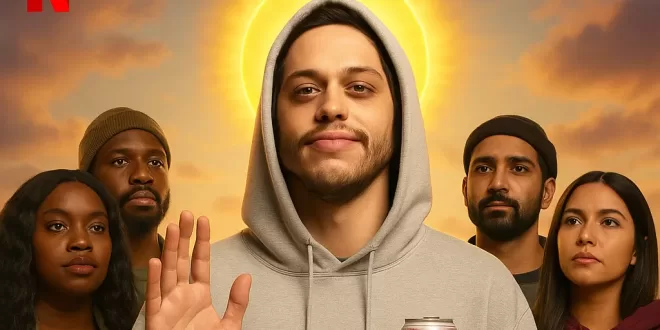HOLLYWOOD HILLS — Netflix detonated a holy hand grenade into the culture wars this week by casting Pete Davidson as Jesus in the upcoming dramedy The Chill Messiah. The hoodie-wearing, vape-puffing Messiah will stroll the streets of modern suburbia, turning water into White Claw and delivering sermons in TikTok-friendly bursts.
Religious leaders, political commentators, and bored Twitter warriors quickly dove head-first into a furious online brawl over the show’s creative liberties and racial representation.
“I’m just saying, the real Jesus didn’t have neck tattoos and a vape pen,” said Reverend Carl Benson of the Coalition for Traditional Imagery. “And while we’re at it, he probably didn’t say ‘blessed are the chill.’”
Netflix claims the show is an “inclusive re-imagining,” but critics have already pointed out that casting a lanky white comedian from Staten Island as a Middle Eastern figure might be… less than historically accurate. Social media lit up with takes like, “What’s next? Ryan Gosling as Malcolm X?”
Plot, Characters, and Racial Firestorms
The Chill Messiah centers on Jesus (Davidson) relocating to a gentrifying desert town, where his sermons are live-streamed, branded, and monetized. Kim Kardashian plays Mary Magdalene—reimagined as “Mary Mag,” a social-justice influencer with a branded robe line.
In episode three, Jesus launches a “Love Thy Neighbor” block party, but the diverse guest list accidentally gets segregated when his disciples “organize the seating by vibes.” Twitter quickly explodes with #MiracleOrMicroaggression trending for three days straight.
“I have no problem with Jesus in sneakers,” tweeted actress and activist Yara Shahidi. “I have a problem with Netflix pretending this is representation while ignoring actual Middle Eastern actors who’d crush the role.”
The production insists the supporting cast features “plenty of actors of color,” though the trailer reveals most of them play either background apostles or people Jesus heals in montages.
Political Spin and Culture-War Mileage
As expected, lawmakers couldn’t resist chiming in. A Florida state senator proposed a bill banning “racially misleading portrayals of religious figures.” The bill is mostly symbolic but sparked hours of cable news segments. Meanwhile, an Oakland city council member tweeted:
“If white America can accept a white Jesus in a hoodie, maybe it can accept Black Santa without losing its mind.”
On the conservative side, talk-radio host Rick Donner labeled the show “the woke mob’s desperate attempt to erase the Messiah’s sacred whiteness”, somehow reversing centuries of church art history in one sentence.
By week’s end, the racial discourse had become its own form of marketing. Netflix’s head of PR posted: “We welcome all perspectives, especially when they help us trend for free.”
Audience Reaction & Meme Warfare
For every viewer who finds the show offensive, another calls it “the most relatable Jesus ever.” Instagram fills with fan edits of Davidson photoshopped into stained-glass windows, the caption reading: “He died for your likes.”
TikTok skits parody Jesus doing miracles but only for people who “look like they’d vote for him.” One viral video shows Davidson handing out loaves and fish exclusively to “cool-vibe disciples” while everyone else waits in the sun.
“This Jesus passes the vibe check,” says comedian Hasan Minhaj. “But the historical accuracy? Not even close. Still, if the guy’s healing people and making bread, I’m not complaining.”
In a meta twist, Netflix has reportedly added a bonus episode titled “Color Correction” in which Davidson’s Jesus debates an academic about ancient Judean skin tones while sipping an oat-milk latte.
A Savior for the Social-Media Set
At its heart, The Chill Messiah lampoons both religious and racial double standards in pop culture—how America casually accepts some historical liberties while losing its mind over others.
It’s a parody of a world where sacred imagery is just another IP to reboot, racial identity is a branding exercise, and a Palestinian rabbi can be recast as a Staten Island comic because algorithms say Gen Z will click on it.
Whether Pete Davidson’s Jesus will spark a spiritual revival or just another Twitter flame war remains to be seen. What’s certain is that Netflix has found a way to turn even the Son of God into a headline-grabbing culture-war influencer.
 Lampoon Tribune The most trusted news on the net. Facts first.
Lampoon Tribune The most trusted news on the net. Facts first.




